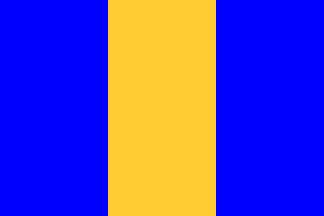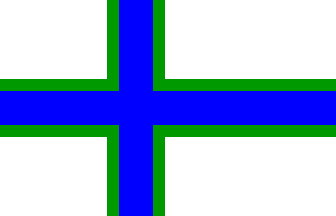
FOTW beschäftigt sich mit der Wissenschaft der Vexillologie (Flaggenkunde).
Alle auf dieser Website dargebotenen Abbildungen dienen ausschließlich der Informationsvermittlung im Sinne der Flaggenkunde.
Wir distanziert uns ausdrücklich von allen hierauf dargestellten Symbolen verfassungsfeindlicher Organisationen.
Last modified: 2021-08-26 by valentin poposki
Keywords: izhor |
Links: FOTW homepage |
search |
disclaimer and copyright |
write us |
mirrors
 Peter Hans van den Muijzenberg, 24 Feb 2008
Peter Hans van den Muijzenberg, 24 Feb 2008
For some reasons, unknown to me, the flag below was abandoned in favor
of the present design (by the same Vladinir Zernov, Sankt-Peterburg
heraldist, who has helped with the development of Votia's flag).
The flag is still unofficial, but displayed at the Izhorian Museum
in the village of Vistino.
Chrystian Kretowicz, 24 Feb 2008
 Chrystian Kretowicz, 24 Feb 2008
Chrystian Kretowicz, 24 Feb 2008Another ugro-finnic nation in northwesternern Russia. Their language is the closest to Karelian and on the verge of extintion. Izhorians number only 327 and live mostly in Lomonosovskiy Rayon of Sankt-Peterburg and Kingiseppskiy Rayon of Leningrad Oblast' between Narva and Neva rivers and along Izhora river. A few Izhorians are also found in Estonia. They were subjects to the Republic of Great Novgorod until 1611 when they found themselves under the Swedish rule. After Peter the Great's victory in the Northern War they were placed under the Russian tutelage in 1721. In 1735 there were about 14,500 Izhorians counted in Ingermanland. During 1940-44 Soviet-Finnish wars, Stalin ordered a mass deportation of the native people, including Izhorians, to the Kazakh steppe and Siberia.
When Khrustchev allowed them to return to their homeland in 1956 only
the miserable remnant of the nation was left. Most, quickly
assimilated and the rest is struggling to maintain their identity.
At the Finno-Ugric Congress in Tallin in 2004, the Izhorians,
represented by the leaders of the Shoykula Cultural Society,
were indentified by the provisional (and handsome IMHO) flag
among the multitude of nations ranging from Hungarians to Nenets.
That flag was the blue, Scandinavian cross, fimbriated in green,
om the white field. It was supposed to represent the Izhora River
flowing among woodlands in the winter landscape.
Chrystian Kretowicz, 24 Feb 2008
Hosted by: Fanshop-Online.de und Handy-Shop.de
Tipp: Apple iPhone 12 im Shop